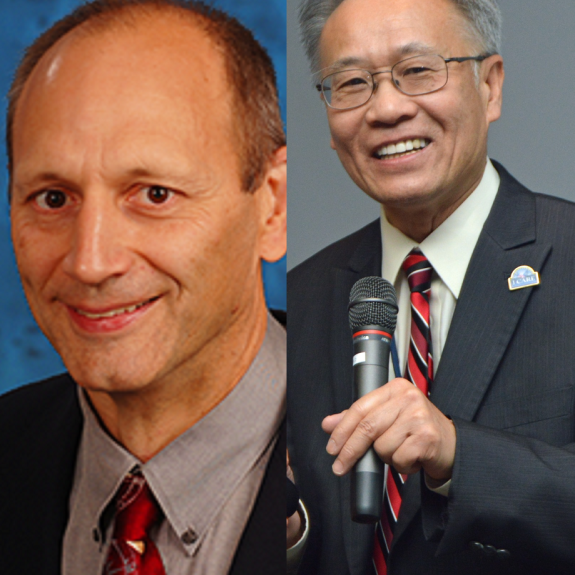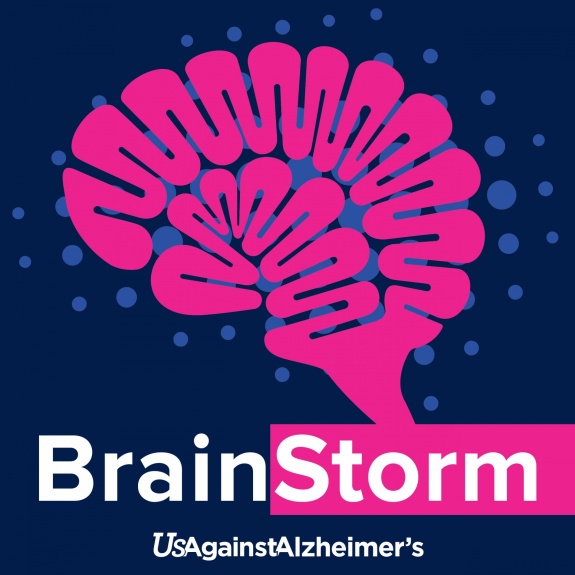Subscribe on your favorite player
Listen on Apple Podcasts Listen on Spotify Listen on Stitcher Listen on Google PodcastsVeterans & Alzheimer’s: What's The Link? What Resources Are Available? Thomas Edes, MD & Alex Chiu, PhD

About This Episode
For Veterans Day, our Alzheimer’s Talk focused on the Alzheimer’s risks that veterans face, the Department of Veterans Affairs research working to understand this connection, and the great VA care and services available to veterans living with Alzheimer’s, their care partners and their families. Some quick facts:
- Nearly half of America’s veterans are 65 or older, compared to just 15% of the general population, so veterans face above-average risk for Alzheimer’s.
- Veterans over age 75 are the fastest-growing segment of veterans. VA estimates that more than 750,000 older veterans have Alzheimer’s and other dementias—and that the number of its enrollees with Alzheimer’s grew 166% from 2004 to 2014.
Click the 'Play' button under the image at left to hear the full conversation.
Two VA experts joined our moderator, Shawn Taylor, president of our VeteransAgainstAlzheimer’s network, to discuss the Alzheimer’s research and the resources available to the veteran community. Thomas Edes, MD, is Director of Comprehensive Geriatrics & Palliative Care at the Department of Veterans Affairs. Alex Chiu, PhD, is a neurobiologist in the Veterans Health Administration Office of Research & Development, managing research in neurodegenerative diseases.
Dr. Edes noted that seeking a diagnosis for suspected Alzheimer’s or dementia is an important first step. The condition may not actually be dementia. And some dementias have reversible causes, such as vitamin B12 deficiency. In addition, many things can be done to slow cognitive decline: exercise, diet, sleep, intellectual stimulation, stress management, and addressing hearing loss to maintain social connectedness. If a veteran’s brain function seems to be declining, it is important to come in for care, particularly after a sudden change, which is likely to be a medical emergency.
To receive a diagnosis, start with your VA primary care provider. He or she can work with a specialist if needed. The earlier the diagnosis, the better. In early-stage Alzheimer’s, decisional capacity is still present, so the person living with the condition can still communicate what’s important to them, how they want decisions made about their care, and what decisions to put in writing so others can follow them later. Such early discussions make later decisions easier for family members.
As moderator Shawn Taylor observed, “A diagnosis of Alzheimer’s is not the end of the world. It is life-shattering, but you have time to do the necessary things to be involved and have a voice in your future, to communicate with your family before things go further.”
VA Services for Veterans
“We want people to have a sense of optimism,” said Dr. Edes. “There’s a lot the veteran with dementia can still do for themselves—and a lot the VA can do for the veteran and the caregiver.”
Dr. Edes described a comprehensive range of VA services for veterans who have chronic, disabling conditions such as Alzheimer’s:
- Home-Based Primary Care: As veterans living with Alzheimer’s lose the ability to drive, VA’s home-based primary care offers a multi-disciplinary team for medical, mental health and functional challenges: physicians, nurses, rehabilitation therapists, dieticians and mental health specialists. They will help manage chronic conditions, like diabetes and high blood pressure, that contribute to cognitive decline. Home alteration services (wheelchair ramps, bathtub grab-bars) are also available, to help veterans stay at home longer. And a social worker can connect veterans with local services, such as home health aides and adult day healthcare.
- Adult Day Healthcare: Available at all VA medical centers, this resource can be a bright spot for veterans living with Alzheimer’s. Interacting with fellow veterans at these locations can have positive effects on mood and help maintain cognitive and language skills.
- Compensation & Pension Examinations: As veterans with Alzheimer’s begin to lose some functions, their VA social worker can help them learn if other benefits are available to them.
VA Resources for Family Care Partners
- Respite Services: To allow family care partners breaks to tend to their own needs, VA offers in-home or inpatient respite services, including a home health aides and adult day healthcare.
- Caregiver Support Programs: These include education, training and emotional support.
- Medical Foster Home: For veterans without a family care partner who do not want to go to a nursing home, this program identifies someone locally who is willing to take in the veteran and become their care partner, providing 24-hour supervision. VA will train the care partner, check in to ensure the arrangement works, and provide home-based primary care.
VA Research: What We Know About Veterans & Alzheimer’s
“VA research is focused on advancing veterans’ care—if it doesn’t help veterans, VA does not pursue it,” said Dr. Chiu. “VA is very committed to advancing research in this area.”
On the link between Alzheimer’s and traumatic brain injury (TBI), so common in the conflicts in Iraq and Afghanistan, Dr. Chiu says science doesn’t have an easy answer, but there is a connection. A study last year showed mixed results, but it focused on veterans from the Vietnam era, before soldiers had protective armor. Vietnam-era veterans who survived TBIs generally had milder brain injuries. Another study looked at the electronic health records of all veterans enrolled in the VHA—so it includes veterans from more recent conflicts. It found a stronger link between TBI and Alzheimer’s/dementia and that the risk seems related to severity of the brain injury.
Of potential connections between Alzheimer’s and depression or PTSD, Dr. Chiu says the linkage between Alzheimer’s and PTSD is better documented. One VA study found an increased Alzheimer’s risk among veterans suffering with PTSD. However, those with PTSD are more likely to be withdrawn socially, have difficulty sleeping, and not seek help—each of which may contribute to dementia. So more research is needed.
Additional Resources
To learn more, veterans interested in participating in VA Alzheimer’s research can visit https://www.research.va.gov/for_veterans/find_studies.cfm.
VA research mentioned in this Alzheimer’s Talk:
- Association of Mild Traumatic Brain Injury With and Without Loss of Consciousness with Dementia in US Military Veterans (Barnes et al, JAMA Neurol 2018, 75:1055-1061)
- Traumatic brain injury may not increase the risk of Alzheimer disease (Weiner et al, Neurology 2017, 89:1923-1925)
- Interactive Effect of Traumatic Brain Injury and Psychiatric Symptoms on Cognition among Late Middle-Aged Men: Findings from the Vietnam Era Twin Study of Aging (Kaup et al, J Neurotrauma 2018, epub https://doi.org/10.1089/neu.2018.5695
- Subjective and objective cognitive function among older adults with a history of traumatic brain injury: A population-based cohort study (Gardner et al, PLoS Med, 2017, 14:e1002246)
- Neurobehavioral Characteristics of Older Veterans with Remote Traumatic Brain Injury (Peltz, et al, J Head Trauma Rehabilitation, 2017, 32:e8-e15)
